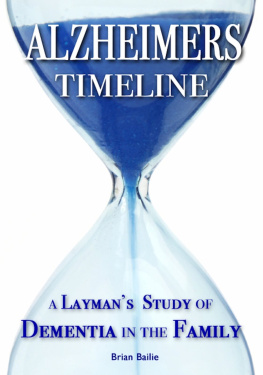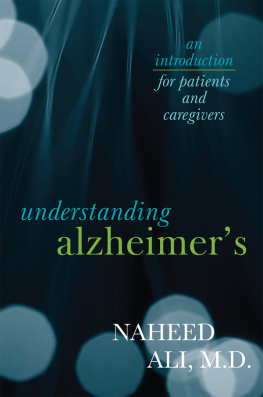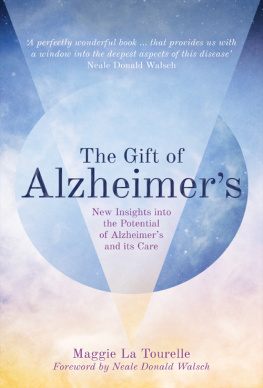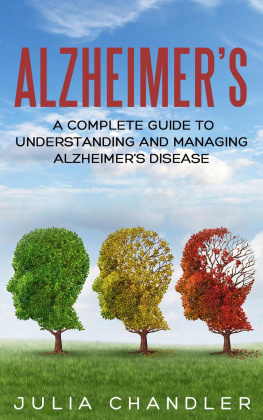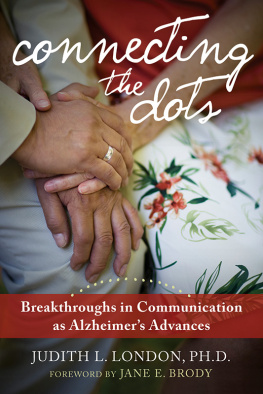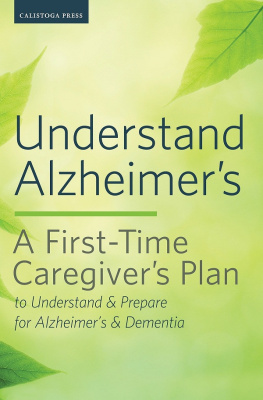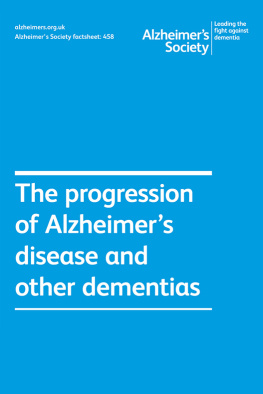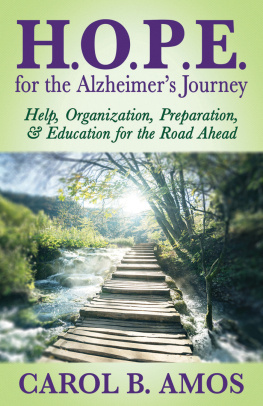Brian Bailie - Alzheimers Timeline
Here you can read online Brian Bailie - Alzheimers Timeline full text of the book (entire story) in english for free. Download pdf and epub, get meaning, cover and reviews about this ebook. year: 2013, publisher: eBookIt.com, genre: Science fiction. Description of the work, (preface) as well as reviews are available. Best literature library LitArk.com created for fans of good reading and offers a wide selection of genres:
Romance novel
Science fiction
Adventure
Detective
Science
History
Home and family
Prose
Art
Politics
Computer
Non-fiction
Religion
Business
Children
Humor
Choose a favorite category and find really read worthwhile books. Enjoy immersion in the world of imagination, feel the emotions of the characters or learn something new for yourself, make an fascinating discovery.
- Book:Alzheimers Timeline
- Author:
- Publisher:eBookIt.com
- Genre:
- Year:2013
- Rating:4 / 5
- Favourites:Add to favourites
- Your mark:
- 80
- 1
- 2
- 3
- 4
- 5
Alzheimers Timeline: summary, description and annotation
We offer to read an annotation, description, summary or preface (depends on what the author of the book "Alzheimers Timeline" wrote himself). If you haven't found the necessary information about the book — write in the comments, we will try to find it.
Alzheimers Timeline — read online for free the complete book (whole text) full work
Below is the text of the book, divided by pages. System saving the place of the last page read, allows you to conveniently read the book "Alzheimers Timeline" online for free, without having to search again every time where you left off. Put a bookmark, and you can go to the page where you finished reading at any time.
Font size:
Interval:
Bookmark:

I am just the son of a beautiful woman whose mind was stolen from her.
Im not a doctor, I need a spell-checker to write psychiatrist . Ive no medical education or experience. And there are millions of people just like me, who really dont understand half the information were told by health professionals. So I want to just describe my experience of Alzheimers disease in my family, in plain language, like it was, and how it is.
Over the past fourteen years or so, Mums mind has dissolved relentlessly, like sugar in warm water, and it has left her in a perpetual existence of total and complete mental and physical inability and total dependency.
Yes, this is a personal, frequently embarrassing and emotional story for me to write. But I know that my mum would want her experience and suffering to be used to help and prepare others; to help you avoid the mistakes that I made; to speak to you in the honest words of a simple helpless layman.
The thing about hindsight is that it only makes you wiser if youre going to do something over again. I dont like to think about having to care for another loved one with dementia, but Id like to think that my story will help others. So the sole reason for publishing this account of my mums decline is the hope that my experience and my hindsight will help you:
Help you to anticipate problems.
Help you to plan care arrangements.
Help you to prepare practically and emotionally.
Help you to realise the importance of legal and financial issues.
Ive had to walk a delicate line: I have a younger sister, and an elder brother. Hilary was happy enough for me to make decisions and change things within reason, but because Paul is older than me, I really felt that he shouldve been more involved with the significant decisions, especially any decisions to do with moving money around, or spending it. But Paul had emigrated years ago, and so his involvement was limited to his opinion, and his approval or disapproval.
Trust is the key. Not that I was mistrusted, but the first decision I made about my involvement with Mum and Dad was that everything that I did would be totally transparent. Consequently, the only reason that I can catalogue Mums decline so accurately is because I put everything in writing: every event, every decision, every incident, every diagnosis was written down and emailed to Paul as it happened. So this little book, and the accuracy of the timeline of Mums decline into total dependency, is the direct result of my correspondence with my brother.
To help me identify the clinical stages of my mums Alzheimers disease Im using the seven-stage scale developed by renowned Alzheimers specialist, Dr Barry Reisberg . This is known as the Global Deterioration Scale . This scale is used by mental health professionals to categorise the phases of degeneration with Alzheimers disease.
No Cognitive Decline
No subjective complaints of memory deficit. No memory deficit evident on clinical interview.
Global Deterioration Scale Barry Reisberg, MD
Well thats reassuring: were all at least Stage 1 of dementia, like a ticking time bomb that may, or may not have a detonator. It isnt very helpful. Is this just some over-analytical chin-stroker trying to be clever; or should I be worried?
If I summarised Mums character before she began to suffer from dementia, I would describe a very fun and child-like personality. Mum was out-going, loving, trusting, a little nave perhaps, perpetually happy, and a little too selfless. She was also dippy, scatty, disorganised, untidy, through-other, and may have been described as happy-go-lucky. Everyone loved Mum, and Mum loved everyone. I dont think any of these characteristics can be identified as anything other than perfectly normal. However, I accept that most of these characteristics can also be identified as symptoms of something more sinister.
Very Mild Cognitive decline
Subjective complaints of memory deficit, most frequently in the following areas:
(a) forgetting where one has placed familiar objects;
(b) forgetting names one formerly knew well.
No objective evidence of memory deficit on clinical interview. No objective deficits in employment or social situations. Appropriate concern with respect to symptomatology.
Global Deterioration Scale Barry Reisberg, MD
But everyone does this (dont they?). I frequently forget the name of my dog, (one reason why Ive trained it to come to my whistle). And of course I know the names of my own children, but occasionally, mid-sentence, I might refer to them with another familiar name. Its frustrating for me, and its annoying for my child; but is this dementia? Of course it isnt, its just normal. Everyone does it.
You mean to tell me that youve never gone to get something, walked into a room to get it, and stood there like an eejit trying to remember why youre there and what youre looking for? We all do stuff like this. Its called being relaxed; your brain is on stand-by, were just mentally freewheeling (arent we?). I think that what the Global Deterioration Scale wants to emphasise is that this kind of forgetfulness is a symptom of Stage 2, however its also a symptom of being a relaxed, perfectly healthy human being.
To put this into the context of my mums early symptoms, no one noticed anything, because as Ive already described her, she had always been dippy, scatty, and disorganised. And with Dad beginning to suffer from ill health, Mum was bound to be worried, I never thought twice about her being a little more disorganised or more forgetful than usual.
Mild Cognitive Decline (Mild Cognitive Impairment)
Earliest clear-cut deficits.
Manifestations in more than one of the following areas:
(a) patient may have gotten lost when traveling to an unfamiliar location;
(b) co- workers become aware of patient's relatively poor performance;
(c) word and name finding deficit becomes evident to intimates;
(d) patient may read a passage or a book and retain relatively little material;
(e) patient may demonstrate decreased facility in remembering names upon introduction to new people;
(f) patient may have lost or misplaced an object of value;
(g) concentration deficit may be evident on clinical testing. Objective evidence of memory deficit obtained only with an intensive interview. Decreased performance in demanding employment and social settings. Denial begins to become manifest in patient. Mild to moderate anxiety accompanies symptoms.
Global Deterioration Scale Barry Reisberg, MD
Behaviour timeline:
Noticing that Mum was becoming unusually forgetful.
Professionals showing concern for the consequences of Mums scattiness.
Friends and family showing concern for Mums confusion.
Frustration at my inability to reason with Mum.
Mums resentment of the introduction of assistance.
Mums continual denial of any problem with her memory.
Questioning if Mums condition is dementia, or if it could be just stress-related.
Mums occasional ability to demonstrate lucidity to disguise her inner confusion.
Mums neglect of her own personal hygiene.
Event timeline:
The eventual realisation that Mum needed help and support.
Difficulty and reluctance to interfere with Mums established position within the family.
My difficulty making the transition from child of a parent, to decision-maker of the parent.
Font size:
Interval:
Bookmark:
Similar books «Alzheimers Timeline»
Look at similar books to Alzheimers Timeline. We have selected literature similar in name and meaning in the hope of providing readers with more options to find new, interesting, not yet read works.
Discussion, reviews of the book Alzheimers Timeline and just readers' own opinions. Leave your comments, write what you think about the work, its meaning or the main characters. Specify what exactly you liked and what you didn't like, and why you think so.

